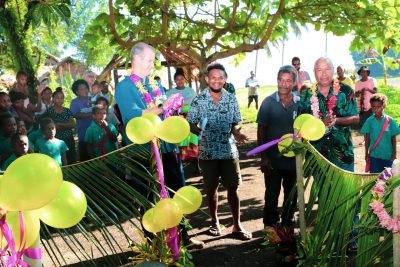AUSTRALIAN HIGH COMMISSIONER HANDS OVER WATER SUPPLY, VISITS COMMUNITIES IN MAKIRA
On the second day of his visit to Makira-Ulawa Province, High Commissioner Rod Hilton handed over a water source project at Mwanihuki village in Central Makira. This project is funded through Australia and built by the community.
The project now supplies water to 345 people in Mwanihuki.
The construction of standpipes, a tank and a pipeline to the village helps the Mwanihuki Community with reliable access to water and improved sanitation.
“I’m very happy to come here and celebrate the completion of this Water Source Project,” High Commissioner Hilton told the community during the handover ceremony.
“This project was a partnership between the Australian Government and the community in Mwanihuki.
“This water source will help Mwanihuki and other communities improve access to water; improving health and livelihoods for all. Australia knows that access to water is fundamental to everyone’s livelihoods, including for men, women and children,” he said.
High Commissioner Hilton also acknowledged the talented children from Alto School, and community for sharing the beautiful Takeanapara culture, food, handicrafts and song.
He was delighted to see the children benefitting from the Stronger Education Together (SET) project, which aims to improve parental and community capacity to support children’s learning in early childhood and basic education in Makira Province.

High Commissioner Hilton was joined by Premier Julian Maka’a in opening a water source at the Mwanihuki village in Central Makira.
SET is delivered by World Vision Solomon Islands and supported by the Governments of Australia, New Zealand and Solomon Islands.
“It was such a pleasure to see the committed Alto School teachers, using local materials as part of their teaching for the students. I can see how engaged the teachers, parents and whole community are in the education of these young children.
“Education is so important. It plays a significant role in every person’s life. It builds confidence, character, intellect and skills, and ultimately helps us to get jobs and to contribute to our communities.
“Australia is proud to be the number one supporter of education, working closely with the Ministry of Education, New Zealand, and wonderful partners like World Vision,” High Commissioner Hilton said.
High Commissioner Hilton also visited Kokana village and witnessed firsthand a cocoa model farm and solar cocoa dryer supported by Solomon Islands Market Linkages Project Phase II.
“Australia is proud of our partnership with Solomon Islands and with Makira. Agriculture is an important sector for the Solomon Islands national economy, and especially important in this province.
“We believe in the potential of the agricultural, and specifically cocoa, sector – it creates economic opportunities outside of Honiara and particularly here in Makira,” High Commissioner Hilton said.
Mr. Hilton travelled with the World Vision team to see how Australia’s support is contributing towards the sustained well-being of people in Makira province.
“I acknowledge the immense collective work, partnership and effort by World Vision, Kokonut Pacific Solomon Islands, village leaders and project partners. I’m also excited that Australia is supporting the next stage beyond building the community of cocoa farmers and connecting them to Honiara’, said Mr. Hilton.
“I hope the funds gained from your cocoa business are making a difference for your families and communities, raising incomes to pay for school fees, heath and improved housing’,” he said.
High Commissioner Hilton also met with the chair lady and the members of the Tawapuna Village Disaster Committee in Makira.
It is encouraging to see the community has identified a woman to lead the village disaster committee since women are disproportionately disadvantaged during disasters.
Under the Australian Humanitarian Partnership (AHP), Australia is working together with World Vision Solomon Islands and the Tawapuna community to increase community resilience. A key objective of the program is to ensure communities have inclusive and integrated disaster risk reduction so they can better prepare for and respond to and recover from disasters.
ENDS//
– AHC MEDIA RELEASE

